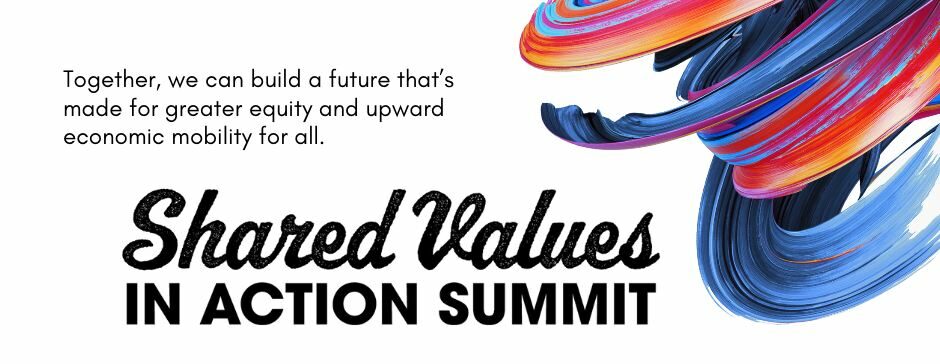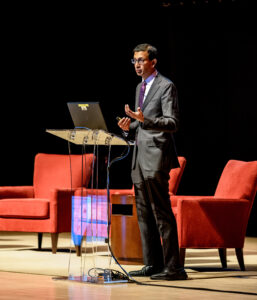Raj Chetty Examines the American Dream in RVA: ‘The Roots of Economic Opportunity Are Hyper Local’

Harvard economist Raj Chetty joined attendees at the third annual Shared Values in Action Summit in September to discuss opportunities to increase economic mobility for families with low incomes.

Harvard economist Raj Chetty presenting at the third annual Shared Values in Action Summit in September to discuss opportunities to increase economic mobility for families with low incomes. Photo Credit: Courtney Jones
Organized by ChamberRVA, in partnership with the Community Foundation for a greater Richmond and PlanRVA, the day-long event included presentations from local leaders about regional issues and opportunities. During his keynote, Chetty leveraged big data to unpack complex challenges, examined how past decisions and investments continue to impact people today and highlighted strategies to expand economic mobility for everyone in the Richmond region.
Here are five takeaways from his speech.
Economic mobility is no longer guaranteed.
The American Dream – the belief that anyone can attain success and upward mobility based on hard work – isn’t as attainable as it was a half century ago.
According to an analysis by Opportunity Insights, a nonprofit at Harvard University that Chetty leads with a team of researchers, children in the 1940s had a 90% chance of earning more money than their parents. Today, only half of children earn more than their parents as adults.
“Overtime, you see a major fading of the American Dream,” Chetty said. “It reflects a fundamental change in the American economy.”
To study the nation’s upward mobility, Chetty’s team analyzed anonymous tax returns and census data. Disparities by race and geography emerged in the research.
A white male growing up in a low-income family in Richmond is likely to earn $28,000 a year, while a Black man from a low-income family is forecasted to make $18,000 a year.
Across the country, upward mobility is more likely on the West Coast and in the Northeast. But in areas with the largest African-American populations, like the South, intergenerational mobility is lower.
Chetty also looked at downward mobility across the country: White boys from rich families are likely to remain wealthy in adulthood, while Black boys are more likely to become poor than stay wealthy as an adult. Experts point to structural racism as one reason for the gap.
“Imagine the American Dream as climbing a ladder for white Americans,” said Chetty. “For Black Americans, it’s more like being on a treadmill. Even after you climb up after one generation, there are tremendous structural forces to push you back down in next generations, only to have to make the climb again.”
Bring opportunities and skills to where people are living.
Throughout Chetty’s presentation, he offered strategies for restoring the American Dream moving forward, giving kids of all backgrounds better opportunities for upward mobility.
One strategy: increasing workforce skills for people living in the community.
While economic development increases the number of jobs and capital investment in a region, it doesn’t always translate to economic mobility for people living in the area.
A 2014 study led by Chetty found that Charlotte, North Carolina ranked the worst for economic mobility among the country’s 50 largest metro areas (the Richmond region wasn’t included in the ranking). The data suggested the high-paying banking roles were going to people moving to Charlotte, not to people born there.
The ranking was a wake-up call for Charlotte leaders, who created a taskforce to explore challenges, opportunities and policy solutions to increase economic mobility as a community.
Private employers were a key part of the taskforce. Bank of America partnered with Gear Up Charlotte, a nonprofit focused on workforce development, to create internships and career pathways for local residents. Program participants earn average starting salaries of $53,040. For comparison, more than half of the graduates were earning $25,000 or less before enrollment.
By developing people’s skills within the community, leaders and businesses can help individuals access higher paying roles.
Invest in socially connected communities.
Who you interact with can impact your annual earnings.
Chetty and his team analyzed Facebook data across more than 72 million users to assess how social connections impact economic mobility. According to the research, relationships across social-economic lines that Chetty describes as “economic connectedness” boost economic mobility.
Richmond rates relatively low in economic connectedness with 36% of low-income families interacting with affluent families.
“It’s about growing up from childhood in a more connected area,” Chetty said to the Harvard Gazette. “It shapes your aspirations. It shapes the things that you think about, the career paths you think about pursuing. If you’ve never met anybody who’s gone to college, you probably don’t think about applying to college or applying to a place like Harvard.”
While we can increase exposure for families across social-economic lines through housing, transportation and other policies, integrated communities don’t automatically mean more personal connections. A phenomenon called friending bias, the idea that friendships remain class-based even when people are around others with differing backgrounds, keeps individuals disconnected.
For groups looking to combat friending bias, Chetty’s research indicates people see more interaction across class lines in churches, sports clubs and smaller schools.
We’re losing out on innovators and innovation.
“The roots of economic opportunity are hyper local,” Chetty said.
Reducing segregation, investing in communities and encouraging connections are opportunities to increase economic mobility within the Richmond region and beyond. But investing in these priorities doesn’t just support low-incoming communities – it helps everyone, including companies and the innovation economy.
Chetty’s research into economic mobility includes how exposure to innovation increases a child’s likelihood to become an inventor as an adult.
His analysis suggests children from high-income families are 10 times more likely to become inventors than kids from low-income families. Chetty calls the phenomenon “lost Einsteins” – the potential inventors from low-income families that don’t realize their potential because they are not exposed to innovation as a child.
Inequality and disconnection are causing our community to miss out on innovation.
What business and community leaders can do.
Chetty is committed to utilizing big data to restore and energize economic mobility. He encouraged attendees to focus on four actions:
- Recruit talent from diverse groups in partnership with proven sectoral job training programs.
- Invest in socially disconnected communities that historically have lower rates of upward mobility.
- Support policy reform that will increase economic mobility, expanding the talent pool for businesses.
- Measure progress systemically using the tool of big data.
Keep up with the next Shared Values in Action Summit.
Subscribe to The Better Together Connector
Sign up to receive The Better Together Connector, a quarterly e-newsletter designed to highlight the latest efforts, successes and a look ahead from PlanRVA, the Central Virginia Transportation Authority, the Richmond Transportation Planning Organization, and the Emergency Management Alliance of Central Virginia.

